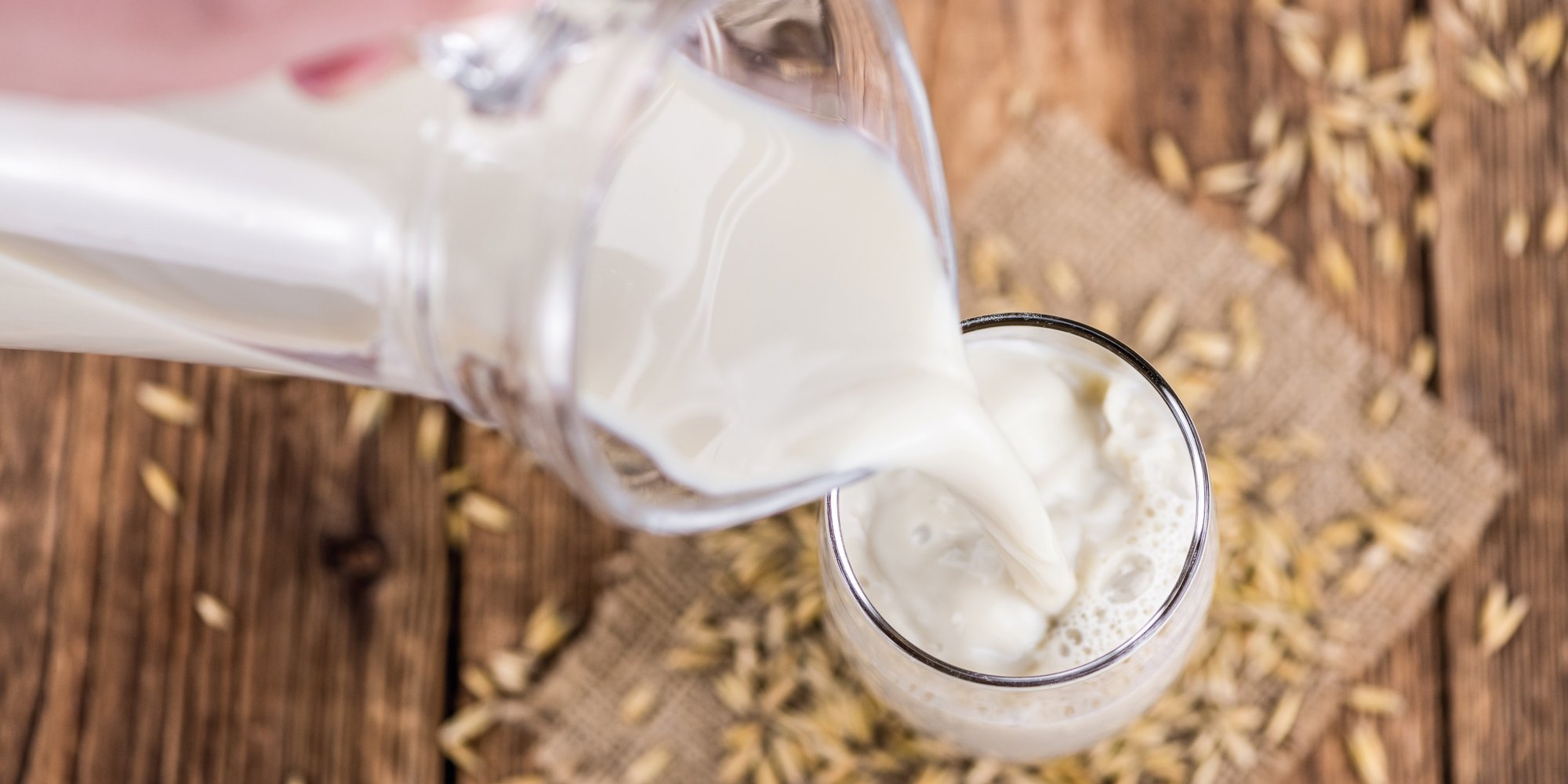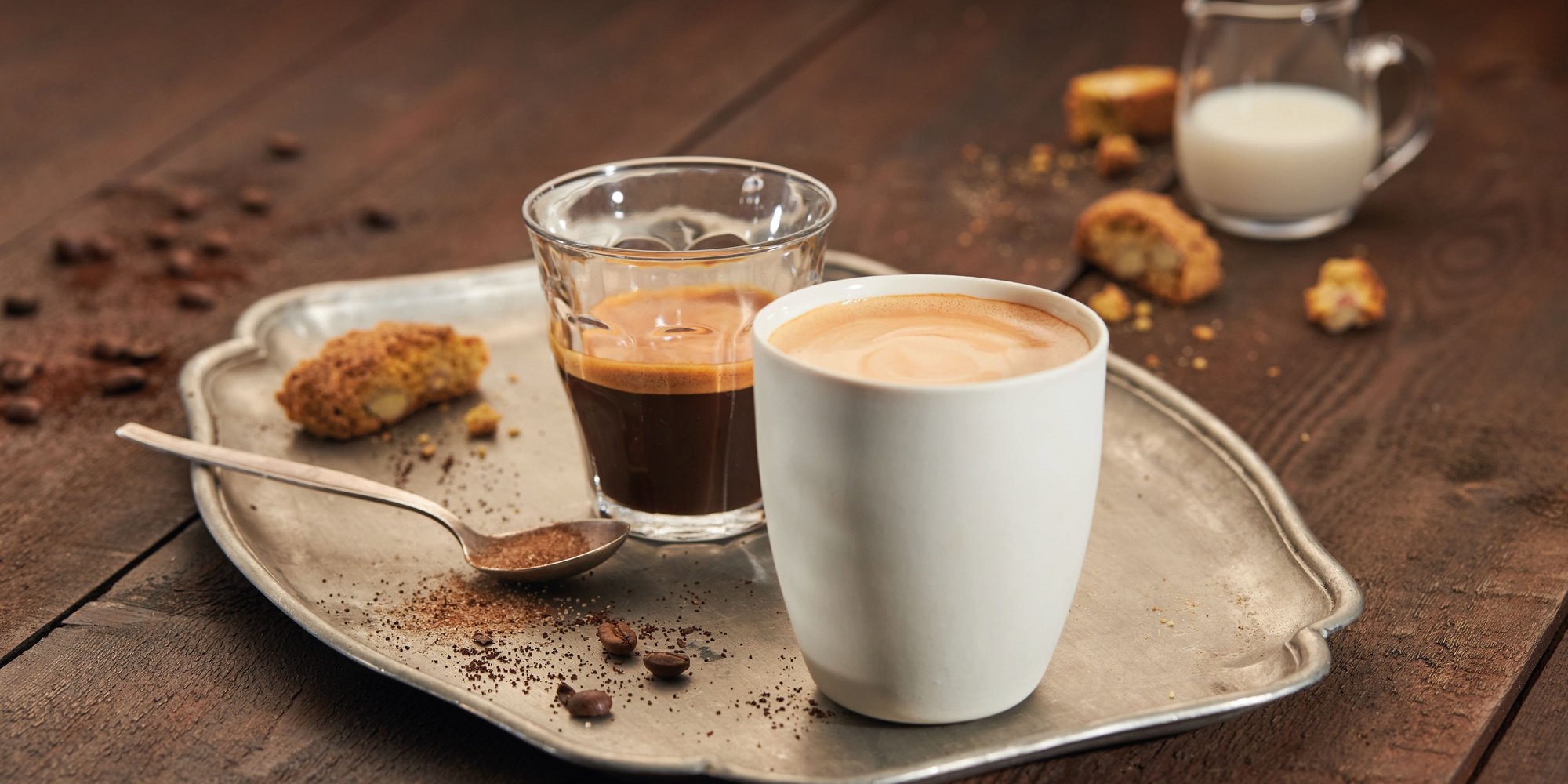Vegan coffee specialities - Indulgence with a clear conscience
Plant-based milk alternatives add lifestyle and variety to the beverage menu.
For more and more people, their mental and physical well-being and a desire for responsible and resource-efficient consumerism play a significant role in their lifestyle. Indulgence with a clear conscience is becoming increasingly important. This has motivated many people to reduce their consumption of meat and animal products or even do without them completely. This social change is making plant-based foods increasingly popular, as well as boosting the market for vegan milk alternatives based on soy, oats, almonds, peas and other plant varieties.
What is your favourite way to enjoy coffee?
There are countless answers to this question. After all, individual coffee preferences are as varied as people themselves, and are also influenced by current lifestyle trends. One trend that is currently keeping the coffee industry busy is the growing demand for speciality coffees made with plantbased milk alternatives. This increase in popularity is due to a wide variety of factors – from the preference for healthier foods to ecological aspects or simply the desire to try something new. Whether in a restaurant, at a hotel breakfast or in the office: oat cappuccinos, soy lattes and other vegan coffee creations now belong on every contemporary beverage menu.
As a coffee machine manufacturer, we have explored this topic in detail and developed technologies that enable these trendy drinks to be prepared automatically. For example, the Schaerer “Twin Milk” system can stock two types of milk/plant-based alternatives, which means the beverage menu can be conveniently expanded to include vegan coffee specialities. But which plantbased dairy alternatives harmonise particularly well with coffee, and how does this affect foam quality? Experts at the Schaerer Coffee Competence Centre have taken a closer look at four popular plantbased dairy alternatives – made from soy, oats, almonds and peas – and have compiled a brief overview for you on the following pages.
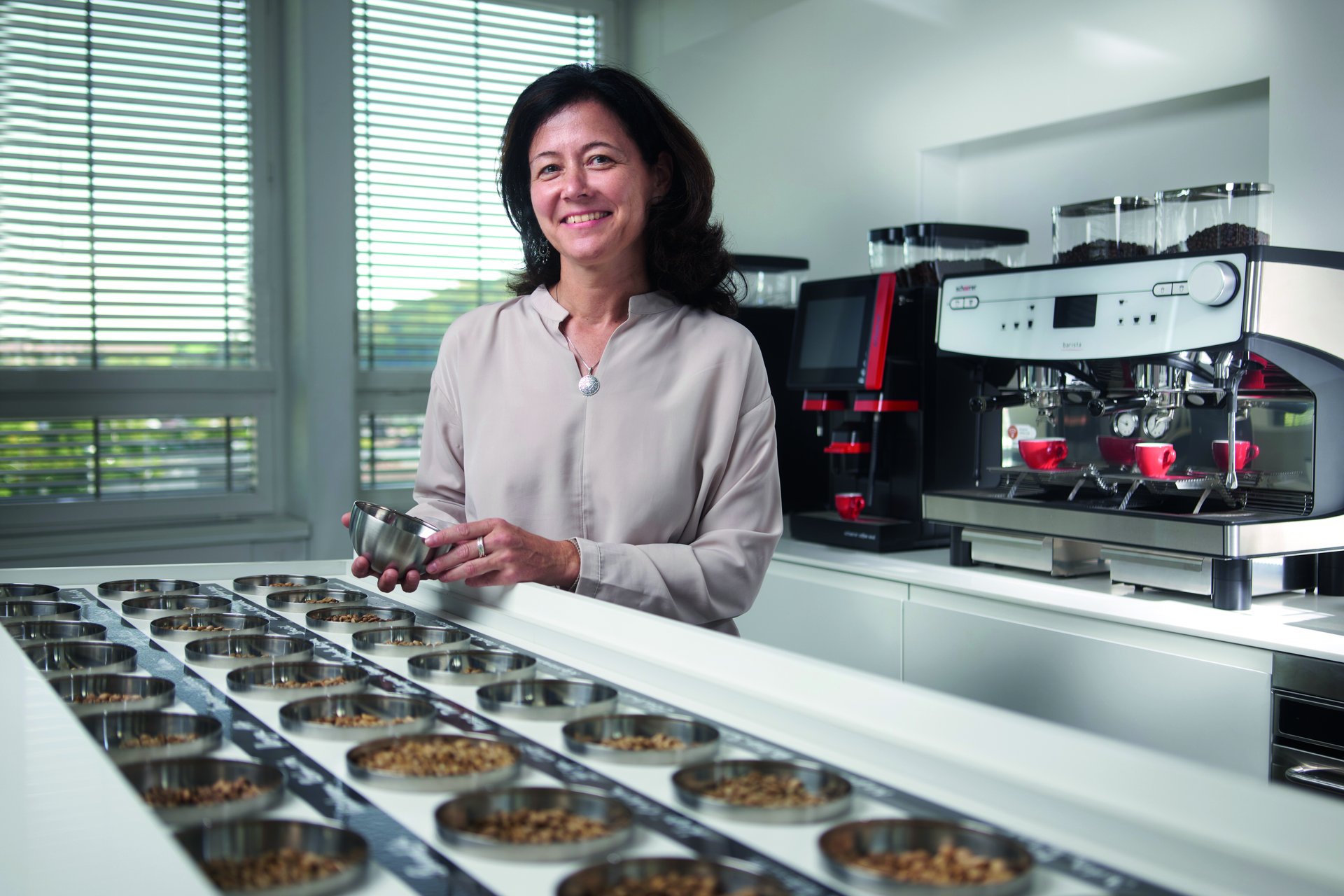
Plant-based milk alternatives are booming
The growing demand for plant-based dairy products worldwide is underpinned by surveys, market analyses and trend studies. For example, Arizton’s report “Non-Dairy Milk Market – Global Outlook and Forecast 2019-2024” (1) believes the global market is likely to exceed $38 billion by 2024, growing at a compound annual growth rate (CAGR) of 14% from 2018 to 2024. Data Bridge Market Research’s industry analysis (2) comes to a similar conclusion, forecasting that the global market for dairy alternatives will grow by 11.4% between 2021 and 2028. The younger generation in particular, also known as Gen Z or post-millennials, is the main driver of this development. According to the Euromonitor Health and Nutrition Survey (3), 54% of Gen Z consumers avoid meat and other animal products. For baby boomers, on the other hand, the figure is 34%.
Alongside a conscious decision in favour of plant-based foods, the increasing number of people with lactose intolerance is also fuelling demand. According to the Plant Milk Report (4) by ProVeg e.V., 75% of the world’s adult population is lactose intolerant.
Sources:
(1) www.arizton.com/market-reports/non-dairy-milk-market-size-analysis (März 2022)
(2) www.databridgemarketresearch.com/reports/global-dairy-alternative-market (März 2022)
(3) www.euromonitor.com/article/the-rise-of-vegan-and-vegetarian-food (März 2022)
(4) Quelle: Silanikove, N., G. Leitner & U. Merin (2015): The Interrelationships between Lactose Intolerance and the Modern Dairy Industry: Global Perspectives in Evolutional and Historical Backgrounds. (März 2022)
Significance for coffee specialities
Today, coffee is much more than a morning pick-me-up. The versatile beverage has become a trend-oriented lifestyle product that coffee drinkers use to underscore their individuality and attitude to life. The increasing popularity of vegan foods is also reflected by higher demand for coffee specialities based on plant-based milk alternatives. Vegan variations on the classic cappuccino or latte macchiato, as well as entirely new creations with soy, oat, almond, pea and other plant-based dairy products, should therefore no longer be missing from any beverage menu.
A cappuccino please – but make it vegan!
Anyone who orders a coffee these days expects the best quality and a wide variety of options from which they can choose their personal favourite. With vegan milk alternatives, the beverage menu can be expanded to include new coffee creations, which helps tap into a larger customer base. The market has grown to offer a wide range of vegan milk alternatives. The experts at the Schaerer Coffee Competence Centre took a closer look at four popular plant-based dairy products made from soy, oats, almonds and peas.
The popular plant-based milk alternatives for speciality coffees
The soy, oat, almond and pea drinks frequently used for speciality coffees are generally available in sweetened and unsweetened varieties. Each of these dairy alternatives is characterised by its individual taste, aroma, consistency and foaming ability, which influences the flavour and appearance of the coffee specialities prepared with it. The fat content also contributes to creaminess, with soy and pea alternatives in particular but also almond drinks containing more fat in their unsweetened, natural variant* than oat drinks. To produce a better foaming quality of plant-based dairy alternatives, manufacturers offer so-called barista editions. Stabilisers are added to these varieties, which results in better foaming, thereby ensuring the desired foam consistency for the respective coffee specialities or latte art creations. On the other hand, the stabilisers ensure that the plant-based alternative retains its consistency when combined with coffee. This is because the acidity of the coffee or too great a difference in temperature between the coffee and the plant-based alternative could cause the beverage to curdle.
Soy drinks
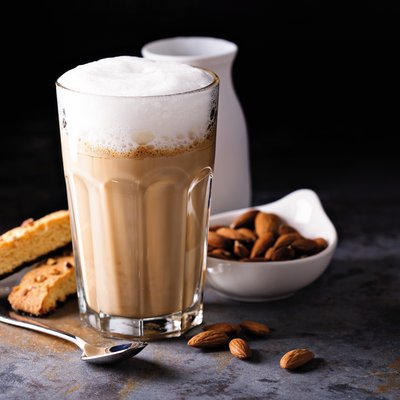
Flavour profile
Depending on which manufacturer produces the soy drink, the products can differ significantly in taste, aroma, and consistency. Some taste neutral, some sweet and cereal-like, while others impart a bean-like, nutty and also earthy aroma. In addition, soy drinks are characterised by a long-lasting aftertaste. The consistency can vary from watery to creamy.
Suitability with coffee specialities
Soy drinks harmonise very well in principle with coffee and are well suited for creating a wide variety of coffee specialities. For products with a strong inherent flavour, care should be taken to use coffee beans with a medium to dark roast – this will not mask the coffee flavour.
Foaming
As a legume, soybeans have a particularly high protein content and exhibit a high proportion of natural stabilisers and acidity regulators, which ensure good foaming stability at temperatures of up to 65 °C. In addition, the fat content of soy drinks makes for a really creamy foam and gives the coffee-soy beverage a nice texture. Thanks to these properties, soy drinks can also be used to create imaginative latte art designs.
Oat drinks

Flavour profile
During the production of oat drinks, the cereal starch is converted into sugar. Therefore, this process lends the milk alternative a slightly sweet taste, even if unsweetened. In addition, oat drinks contribute a cereal-like or nutty aroma that ranges from subtle to pronounced.
Suitability with coffee specialities
The slight sweetness, cereal overtones and creamy consistency of oat drinks allow the coffee to shine and rounds off the flavour profiles of coffee specialities wonderfully. Oat drinks are therefore also well suited for light roasts as well as fruity and acidic roasts. Another advantage of oat drinks: Thanks to the creamy texture, the drinking sensation of oat-based coffee specialities is similar to those prepared with cow’s milk, making them ideal for introducing customers to new beverages.
Foaming
Oat drinks have a rather low protein content. To achieve stable, uniform foaming results, oat drinks must be foamed for a longer period of time. However, thanks to their high stability, even at higher temperatures (higher than cow’s milk: 65 °C) oat drinks can be heated for longer periods without causing unpleasant flavours.
Almond drinks
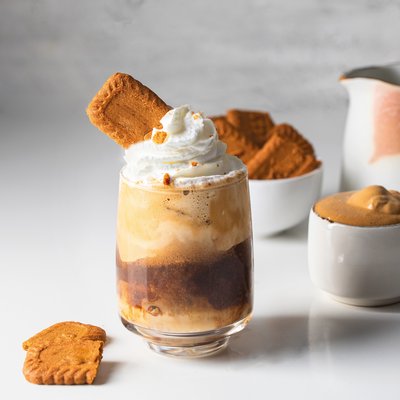
Flavour profile
Almond drinks are characterised by a rather watery consistency. In terms of flavour, these milk alternatives definitely exhibit some sweetness and contribute a nutty aroma. Sometimes they can also have a slightly bitter, lingering aftertaste due to the almonds on which they are based.
Suitability with coffee specialities
In speciality coffees, the slightly bitter almond aroma and comparatively high acidity can overpower the flavour profile of the coffee. Aromatically, the milk alternative harmonises well with light roasts, for example, to which it lends its popular almond aroma.
Foaming
Almond drinks are very difficult to foam because of the protein density. The foam layer becomes rather thin, with large bubbles and high sensitivity to temperature – often the foam collapses at temperatures above 55 °C or when mixed with coffee. This should be taken into account when developing recipes. Almond drinks also come in a variety of barista editions, which may offer better foaming quality.
Pea drinks
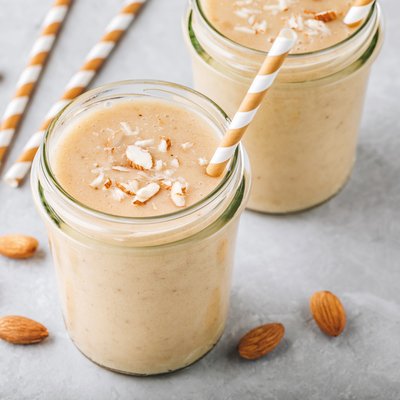
Flavour profile
Pea drinks are usually made from water, pea protein, canola oil and natural flavours. Depending on the variety and manufacturer, sugar, emulsifiers and stabilisers are also added. In terms of flavour, pea drinks have a slightly cereal-like, nutty aroma, contributing a slight sweetness. Depending on the manufacturer, pea drinks can also be characterised as slightly bitter and tart with a somewhat rough finish.
Suitability with coffee specialities
In combination with coffee specialities, the high fat content of pea drinks adds a particularly creamy and velvety consistency to beverages. Thus, pea drinks complement coffee very well and at the same time leave plenty of room for it to develop its individual flavour.
Foaming
Pea drinks have a high protein content compared to soy drinks. This makes them particularly easy to foam. A nice, firm and creamy foaming consistency can be achieved at a temperature of around 65 °C – ideal for stable foaming and creative latte art.
Twin Milk & Best Foam™ – the dream duo for vegan coffee specialities
Whether classics based on cow’s milk, vegan alternatives or even trendy drinks such as cold-brewed or flavoured coffee specialities: there should not be any compromises when it comes to beverage quality. This is where Schaerer coffee machines offer the security that the various beverages are always prepared with the same quality in a process-safe manner, regardless of whether the machine is operated by staff or by a guest.
Best Foam™ milk system
The Best Foam™ milk system allows the preparation of milk-based coffee specialities at barista level – regardless of whether they are based on cow’s milk or a vegan alternative such as oat, almond, pea or soy drinks. From espresso macchiatos to flat whites and cappuccinos.
The patented Best Foam™ milk system heats the milk or plant-based drink at barista level with steam, delivering excellent foam quality. Silky glossy, extremely creamy and stable: foam produced in this way is the perfect basis for vegan coffee creations. The special advantage of Best Foam™: The "Easy Setting " principle, which allows the settings for individual recipes to be stored with a variety of temperatures and foam consistencies – hot or cold, from very liquid to firm. This allows the user to set the most important parameters for the starting product according to their precise specifications and thus achieve the best possible foam result when using vegan milk alternatives.
Experts at the Schaerer Coffee Competence Centre had good experiences with soy, oat and pea-based drinks (barista editions) in their tests and rated the drink foam prepared with Best Foam™ as good. However, since each variety and the different manufacturer brands behave differently, they cannot currently give one general, binding recommendation. But the following applies: The foam result of each milk alternative should be tested before use to check whether the foam result meets your own quality requirements.
Schaerer Twin Milk
The Schaerer cooling unit with Twin Milk system is the basis for switching automatically between different milk alternatives (cow’s milk, lactose-free milk, vegan plant-based dairy alternatives). It has two 4.5-litre milk containers, allowing cow’s milk to be stored in one container and a plant-based alternative in the other. When the respective coffee speciality is selected, the correct variation is automatically used and flows into the cup at the desired temperature and foam consistency. For busy applications, the under-counter cooling unit with two 10-litre containers can also be used as a Twin Milk system. However, as the output of the Twin Milk system does not run through two completely separate systems, there is a risk of cross-contamination. Therefore, intermediate rinsing is recommended when switching between the varieties.
Schaerer steam wands for even more variety
If you want to make the range of beverages even more diverse or impress your guests with latte art creations, you can equip Schaerer coffee machines with additional steam wands. Depending on the model, various alternatives are available. In addition to the Powersteam steam wand for manual foaming, Schaerer also offers two automatic steam wands called Autosteam and Supersteam. Both make foaming much easier: Autosteam has a temperature monitor that automatically shuts down once the set temperature has been reached, preventing the milk from overheating. However, the foam consistency must be monitored manually. The Supersteam steam wand, on the other hand, offers completely automatic milk foaming. The desired temperature and foam consistency can be set individually, and as soon as these have been reached, Autosteam stops foaming.
Recipies for inspiring vegan coffee specialities
The experts at the Schaerer Coffee Competence Centre prepared here their recipies for vegan coffee specialities.
